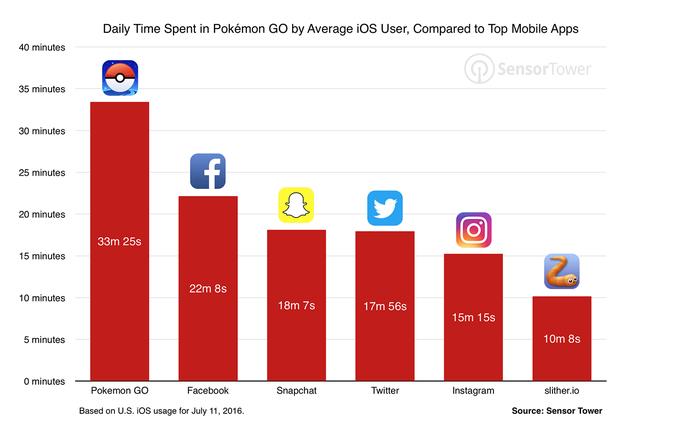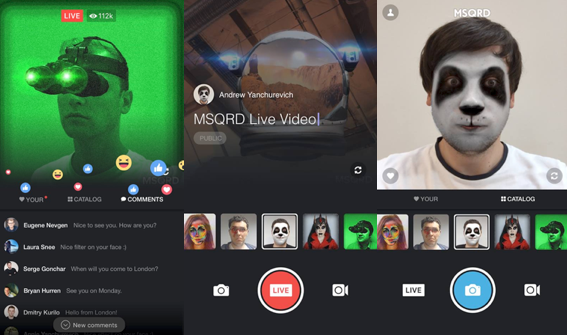 6 months ago, I didn't care a hoot about augmented reality games. But as marketers, they are about to become real darn important to all of us.
6 months ago, I didn't care a hoot about augmented reality games. But as marketers, they are about to become real darn important to all of us.
In California, two men were playing the new mobile sensation Pokemon Go. They were so enthralled in the game they both walked right off a cliff. Pokemon Go has even caused car crashes as folks who were playing the game tried to catch Pokemon characters while they were driving.
A couple days ago, I was in a park letting my niece and nephew play on the children's toys when suddenly, a whole group of adults converged on our location, all staring at their phones and trying to "catch" a squirrel.
For someone who has never played Pokemon (or even knows what it is, really) this was quite the sight.
So what? Who cares about some mobile game?
In a recent SensorTower study, Pokemon Go is outperforming all social networks on the amount of time people spend in the app.

So, you have millions of people walking around (or driving - please don't do that) going wherever the GPS-enabled mobile app tells them to go. This means savvy businesses are going to be buying ads to bring hundreds of these 'zombies' to their stores.
According to TechCrunch, a pizza place in Queens, New York saw a 75% increase in sales by paying $10 to lure a Pokemon Character to their location.
75%!
For a $10 investment.
For local businesses, from large cities to small communities, spending on Pokemon Go ads is a new and exciting way to get more customers. But the makers of Pokemon Go are already saying, advertising isn't going to stop at the local level.
So, yeah, Pokemon Go is a hot topic right now. But how many of your competitors do you think are going to take advantage of it?
Too many marketers arrive at a new marketing channel at the same time everyone else does. And many marketers are too frightened of failure to try marketing channels that aren't already saturated.
It doesn't take a brave soul to advertise on Facebook. Everyone is advertising on Facebook.
It wasn't a marketing guru who thought, "this Pokemon thing might work for this pizza place?" It was the manager.
Be that guy!
Gary Vaynerchuck has been preaching Snapchat for a long time. Only recently have businesses been discovering the marketing possibilities with Snapchat.
Marketers who are smart enough and brave enough to experiment with new marketing channels, even when it's not popular with other marketers are the ones who arrive early, stake their claim, and enjoy low competition.
You can bet Gary Vee will be long gone by the time Snapchat is saturated with marketing.
Let's look at emerging marketing channels that are still unsaturated that you should start caring about, right now!
New Powerful, Unsaturated Marketing Channels
Today, 93% of marketers use content for marketing. Placing that content magnet close enough to leads to draw them in, however, remains a completely separate topic.
Using Strategy to Catapult Content into Your Lead's World
The internet empowers, constantly evolves, and pays dividends to early adopters. Identify how to best utilize emerging trends in apps and technology and find yourself in that category. Embracing new technology and constantly looking for it’s practical applications opens up new skills, new relationships, and new possibilities personally and professionally.
Thanks to technology and the internet, today:
- Everyone is an author - Thank you WordPress
- Everyone is a photographer - Thank you Instagram
- Everyone is a videographer - Thank you YouTube
- Everyone is a broadcaster - Thank you Periscope
As a platform gains popularity, the saturation of the channel swells, making it more difficult to be heard. The sooner you jump on the train, the better your seat, and the higher your chance of success on any platform.
New Technology Opens up New Marketing Channels
The channels you don’t think fit your industry can actually provide a significant boost to the impact of your content.
More than likely, it’s not too late, on even the somewhat new marketing channels like Snapchat (which we will dig further into later). Often, entire industries will stay away from new marketing channels because they just don’t think it is worth the effort, or they just don’t want to invest the time to understand them.
New channels offer new leads, strategic connections, and open doors.
Jumping into a new channel makes sense because your competitors haven't shown up there yet. Not only that, but your prospects and customers are likely to engage more often on this new platform which will gain you recognition as an innovator and industry trail-blazer.
Breaking into new channels is surprisingly easy once you conquer the fear of the unknown.
So, if it’s that easy, then what does it take to break into new channels? Because, let’s be honest, if there were no barriers to entry and it didn’t take something special, everyone would do it!
But cracking a new marketing channel requires insight, innovation, creativity, and commitment.
Take Redbull and Instagram, for instance. Redbull used the platform without hesitation to highlight customers and event partnerships.
They now have 5 million followers.
“Though Red Bull actually uses Instagram the least out of all of its platforms, the platform brings in the most engaged following, generating the most likes and comments. Its follower base is also growing rapidly as the brand continues to share…” says SmartInsights about the company’s campaign.
How to Identify New Marketing Channels
It’s a simple process where intentionality is the most important factor.
The first step starts with keeping your eyes open and alert for new opportunities. If you aren’t the type of person who tracks the latest trends, identify someone who is and keep up with them on social media.
Some Other More Tactical Strategies to Start With Are:
- Monitor forward thinking brands with SpyFu, AHRefs, or the QuickSprout Analyzer
- Fill your Feedly with feeds rich in new technology and marketing trends like Search Engine Land, Marketing Land, Moz, and TechCrunch
- Monitor the online communities like Inbound.org, GrowthHackers, and ProductHunt
- Follow the visionaries on Quora
Don't be intimidated. New technology is specifically designed to for a quick learning curve and easy adoption. That’s what all that talk about UX and user onboarding is about. To really get ahead of the curve, you can even sign up to as an early beta tester on sites like BetaBound.
Best Practices for Marketing Campaign Launch in a New Channel
When you are ready it’s good to have a list of best practices to put in place. The most important steps for launching in a new channel:
- Do your research and spend personal time on the platform
- Document a specific marketing strategy for that channel
- Create specific goals like Buffer does on all of their campaigns
- Stay mindful of existing benchmarks and make new ones
- Implement and analyze your efforts quarterly
Emerging Marketing Strategies to Start Today
1) Snapchat
According to Convince&Convert, Snapchat has more users than Twitter or LinkedIn and they grew more in the last year than Twitter has in 4 years combined. This social platform proves to be no fad. Yet many businesses remain light years from marketing on it.
Getting started with Snapchat requires downloading the application and starting a business account. From there, you want to share your SnapCode on your other social platforms and begin adding followers (similar to how you do on Twitter). To access more tips on Snapchat campaign launches, look here.
2) Live Streaming
Periscope and Blab provide live streaming. These tools entice (and maybe even intimidate) marketers of all industries. However, they boast a variety of applicable uses in marketing.
Periscope launched a month after it’s predecessor Meerkat. Blab and Facebook Live Stream followed closely behind in mid 2015. While YouTube rolls out their mobile app update with LiveStream through the second half of 2016.
Facebook Live is also an emerging live streaming technology that is getting pretty popular. But the audience potential on Facebook isn't even the most exciting thing. The most exciting thing is that Facebook is apparently dedicated to owning the live streaming space, adding in waiting rooms and multi-source streaming.

Photo Credit: TechCrunch
To get started with Live Streaming: choose your platform and document your plan, start promoting in advance on your other social accounts. Make sure to include a call-to-action and build an engagement plan.
3) Extensions and Free Apps
The cost of development remains at an all-time low following the success of sites like Hubstaff and self-training resources like Udemy. Meanwhile, nimble companies adapted and began creating simple software solutions available for free for their prospects.
Examples of this strategy actually evolved from the freemium SaaS model. SaaS companies offer a simplified or temporary version of their service (for free) in order to generate leads, kindle interest, and build credibility. Companies in industries far removed from the tech world can take advantage of this strategy as well.
The strategy is incredibly effective due to it’s value-based nature. It’s the Blue Ocean Strategy of marketing. Solve your prospect’s problem in the open blue waters of no competition rather than the competitive, red waters of gated eBooks, webinars, and infographics.
Due to problem-solution fit and product-market fit differentiation, getting started often proves to be the biggest challenge with this strategy. Consulting an expert on a site like Clarity ensures you have a solid plan in place and head in the right direction.
4) Amazon Self Publishing
Amazon dominates the internet with over 244 million users in 2016. They acquire new companies and launch new software at a dizzying pace (more to come on this later in the article). As we move forward, Amazon will prove to be more and more effective as a lead generation strategy for marketers. One of the most recent marketing trends evolved from Amazon’s self-publishing services.
Industry experts and leaders are now free to publish (e)-Books cheaply and effectively, offering unique insight to their prospects. These books hold a much higher value to prospects compared to the smaller more traditional “e-Book, landing page, thank-you page” workflow.
There are a variety of ways to promote, price, and strategize this approach. Noah Kagan and Ryan Holliday offer valuable insight to get you started. You can also find Amazon’s self-publishing guidelines here. Keep in mind, you do not need to be an expert writer to make this work, you just need to be an expert on your subject.
5) Beacon and Location Marketing
Beacon technology maintains a relatively low profile considering the massive impact it offers to marketing campaigns. Beacons are small, consistently on, devices placed at designated locations.
They equip you to communicate with your prospect or customer based on geo-settings.
With beacon technology you can trigger push notifications to mobile devices with special offers or insights and set multiple distance settings to beckon your prospect closer to a destinatio.
It may sound complicated, but stay with us. A beacon is more affordable than you think, and there are many experts available to give you insight and help you build a strategy around the technology.
Start with these resources:
- Brooke Callahan
- Beacons, Bluetooth and Mobile: The Future of Context Marketing
- iBeacon Technology: Connecting Physical and Digital Worlds
Emerging Marketing Strategies for Tomorrow
True marketing innovation comes ahead of the curve. The companies that can adapt and think proactively reap the reward of being proactive. You don’t have to be from MIT, or understand how to apply Moore’s Law to know that technology continues to advance at breakneck speed, flinging open doors for brand new, uninhibited, uncontested market space.
True innovation takes creativity, faith, and foresight.
1) Augmented Reality
Experts in the tech world forecast Virtual Reality’s (VR) exponential reach to consumers in the next few years. Deliotte Global predicts that VR revenue remains on track to break a billion dollars in 2016. As affordable devices and more realistic software improve its growing popularity, a shiny new door is wide open for marketers.
Virtual Reality uses destinations, products, and services. As this virtual world spreads beyond current boundaries, room for creativity and brainstorming in product and content placement expands with it.
2) Artificial Intelligence
In 2015 the major tech companies (Google, Amazon, Twitter, and Facebook) made tremendous investments in artificial intelligence. The AI race is on, and new inventions emerge daily that incorporate some form of AI. In order to remain competitive and lead the charge do not ignore AI.
Self-driving cars are just one example of how companies productize AI. Ignore the politics and headlines for current product testing. Imagine a driving experience that is more of a relaxing getaway than an active, rage-fueled begrudging task. Sell your stock in companies that produce blood pressure medicine, and recognize that technology like that opens up endless uninterrupted market space for entertainment, health, beauty, retail, and service industries.
3) IoT (Internet of Things)
This new technological wave ushers in a sea of smart, connected devices. Over 4.9 billion connected things found homes in 2015, with the projection at 25 billion by 2020. The Internet of Literally everything becomes connected. Every industry exhibits a connection between IoT and their consumer’s behavior.
Take the connected kitchen for example.
“The connected kitchen will deliver significant benefits across industries spanning retail, healthcare and insurance, in addition to significantly addressing sustainability issues”, Gartner predicts.
“The connected kitchen creates digital business opportunities at several levels in the food supply chain and retail food service,” said Gartner’s Satish R.M. “A real-time inventory data collection from sensors related to kitchen ingredients enables automated generation and ordering of shopping lists, resulting in a streamlined and efficient inventory and optimized supply chain management.”
Amazon quietly opened their API for developers to come in and make products like Triby. This only hastens the speed of which connected devices come to market.
IoT remains an open playing field for creative marketers to innovate and wedge their brand between content, context, and connected things.
Don't Let Marketing Innovation Become a One-Time Thing
Technology never stops moving forward and neither should you.
Build innovation into your processes to encourage and even incentivize employees to keep up with new technologies and present their ideas.
Make it a quarterly task in your company.
Look for new technological trends and brainstorm how you might market to the users of that technology. Attend marketing conferences like Inbound, Traffic and Conversion Summit, and Digital Marketing Day.
From there, start turning over stones, building the right relationships, and getting your magnetic content positioned.
These strategies are for:
- The scrappy, creative companies
- The hungry, new companies.
- The confident corporations
- The local businesses
- The SaaS startups
- The companies you represent
Literally, anyone can stick their finger in the air, see which way the wind blows, and get there first. Just start walking in the right direction.
“Innovation distinguishes between a leader and a follower.” Steve Jobs
Have any stories of marketing innovation of your own? We love hearing from you. Tell us your tale in the comments below.
from HubSpot Marketing Blog http://blog.hubspot.com/marketing/marketing-power-of-unsaturated-marketing-channels
Via http://blog.hubspot.com/marketing/marketing-power-of-unsaturated-marketing-channels

No comments:
Post a Comment